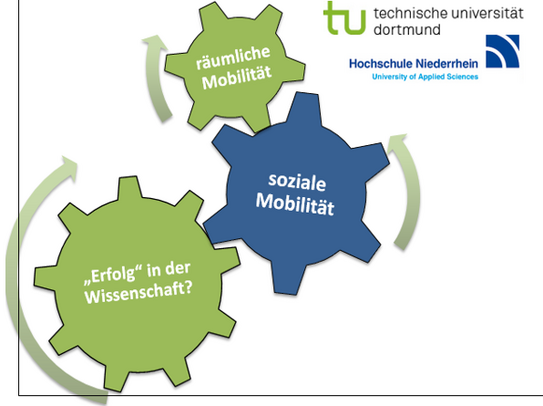Academics 'in motion'
A mixed-methods study on the link between social and spatial mobility of researchers.
The project explores the link between social and spatial mobility of researchers in Germany over the course of time, especially in the biographical retrospective. Against the background of diagnoses of contemporary advanced modern societies assuming an increasing spatial mobility in recent years, we ask whether these growing mobility requirements are likewise virulent in academics – or whether spatial flexibility is rather a congenial feature of academic work.

Beyond the current state of research, we take a systematic look at various academic career stages (PhD candidates, post-doctoral fellows and senior scientists) and analyze the dynamics of the interplay between social and spatial mobility in the form of different process types and trajectories. Taking into account subjective interpretations of different forms of mobility contributes to a profound understanding of cause-and-effect relationships, e.g. by distinguishing between ‘opportunity-’ and ‘survival-driven’-mobility, and transcends the analysis of superficial correlations.
Moreover, the question arises as to which extent and in which ways explanatory factors impact on the interaction of social and spatial mobility in different career stages. In order to tackle this question, we distinguish between three main dimensions: 1) individual characteristics and resources, e.g. in accordance with the concept of ‘motility’; 2) personal attitudes and preferences (which may well change in the course of academic careers); 3) structural conditions, e.g. density of higher education institutions or transport infrastructure.
On this basis, a sociological perspective on social inequality, which considers typical characteristics of academic careers as well as changing societal framework conditions, aims to analyze the importance of spatial mobility for upward social mobility in the academic field.
Our empirical approach involves three forms of research methods: a quantitative secondary analysis of data from various surveys and two additional studies: a quantitative online survey with researchers in selected disciplines and qualitative in-depth interviews with researchers with different mobility experiences. By drawing on existing data sets from the DZHW and the DIW/GSOEP, the target of the secondary analysis is to achieve a high range of the findings, whereas some of our research questions demand a deeper and more differentiated view. Therefore, own quantitative and qualitative complementary data collections are required particularly with regard to subjective attitudes in different career phases. We thus combine approved research methods in a productive way: 1) for our quantitative research agenda: sequence pattern analysis, causal analysis and network analysis; 2) for our qualitative research agenda: analytical strategies following the grounded theory approach.
Project duration
36 months (10/2020 - 09/2023)
Project management
Prof. Dr. Nicole Burzan, TU Dortmund University
Prof. Dr. Nadine Schöneck-Voss, HS Niederrhein University of Applied Sciences/ click here for: further information
Team
Benjamin Neumann PhD, TU Dortmund University
Silke Kohrs PhD, TU Dortmund University
Sören Nonnengart, M.A., HS Niederrhein University of Applied Sciences (Contact)
Adina Korte, B.A., TU Dortmund University (Student Assistant)
Paulus Alexandros, Gkegkas, TU Dortmund University (Student Assistant)
Johanna Marx, B.A., HS Niederrhein University of Applied Sciences (Student Assistant) (Contact)
Publications
| Kohrs, Silke; Schöneck, Nadine M. (2019): Akademische Karrierewege, in: Burzan, N. (ed.): Komplexe Dynamiken globaler und lokaler Entwicklungen, Verhandlungsband des 39. Kongresses der Deutschen Gesellschaft für Soziologie in Göttingen 2018 Volltext |
| Kohrs, Silke (2018): Kategorienbildung in der Anfangsphase – Reflexionen zur quantitativen Erforschung des Zusammenhangs von sozialer und räumlicher Mobilität, in: Burzan, N./Hitzler, R. (eds.): Typologische Konstruktionen. Prinzipien und Forschungspraxis. Wiesbaden: Springer VS. S. 327-344 Volltext |
Oral presentations
| „Erforschung von sozialer und räumlicher Mobilität im Kontext akademischer Karrierewege: Konzeptionelle Ansätze und methodischer Zugriff“ (Silke Kohrs), Vortrag im Rahmen des Workshops Transnationales Sampling und die quantitative Forschung zu Mobilitätsprozessen, Hamburg, January 2020 |
| „The link between spatial and social mobility of higher education staff: Approaches for identifying causal effects“ (Silke Kohrs), Oral presentation within „RS16 - Sociology of Spatial Mobilities“, at the 14th Conference of the European Sociological Association (ESA), Manchester, August 2019 |
| Organization of the Ad Hoc Group „Akademische Wege auf dem Prüfstand. Zum Nexus von sozialer und räumlicher Mobilität in der Wissenschaft“ (Silke Kohrs und Nadine Schöneck-Voß) at the 39th Congress of the German Sociological Association (DGS), Göttingen, September 2018 |
| „Karriere(wege) und Hochschulstandorte: Umzugs- und Pendelmobilität in der Wissenschaft“ (Silke Kohrs und Nadine Schöneck-Voß), Vortrag in der Ad Hoc Gruppe Akademische Wege auf dem Prüfstand. Zum Nexus von sozialer und räumlicher Mobilität in der Wissenschaft at the 39th Congress of the German Sociological Association (DGS), Göttingen, September 2018 |
| „Karrieremobilität in der Wissenschaft: Ohne räumliche Flexibilität auch kein ‚Erfolg’?“ (Silke Kohrs), Vortrag in dem Panel der ÖGS Sektion ‚Soziale Ungleichheit‘ at the Congress of the Austrian Sociological Association (ÖGS), „Soziologie zwischen Theorie und Praxis“, Graz, December 2017 |
| „Kategorienbildung in der Anfangsphase – Reflexionen zur quantitativen Erforschung des Zusammenhangs von sozialer und räumlicher Mobilität“ (Silke Kohrs), Vortrag im Rahmen des Workshops Typologische Konstruktionen und/oder kategoriale Klassifikationen, TU Dortmund University, December 2016 |


![[Translate to English:] [Translate to English:]](/storages/zentraler_bilderpool/_processed_/b/9/csm_Spektralringe_225cc86301.jpg)
